




 |
   |
 |
|
Cremator Marshall Crenshaw Cressida |
Michael Cretu Jim Croce Crocheted Doughnut Ring |
David Michael Cross Sheryl Crow Crowded House |
Rodney Crowell Mark Crozer & the Rels Crucifer |
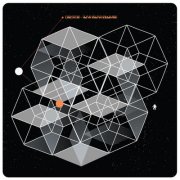 |
Alpha Ralpha Boulevard (2013, 38.00) ***½/TAlpha Ralpha BoulevardCatmaster |
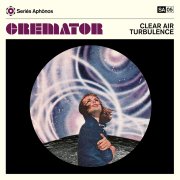 |
Clear Air Turbulence (2014, 37.52) ****/TSpace BeagleLong Shot Vortex Blaster Sunbird Nomad Ringmaster Gnostic Ascension Prometheus Clear Air Turbulence |
 |
Exult1 (2015) ****/T[Cremator contribute]Alien Funeral |
Current availability:
Mellotrons used:
Cremator is an electronic project from Matt Thompson (Rashomon, Zoltan and, incidentally, my brother), recorded entirely utilising my arsenal of vintage keyboard equipment. His first release (although second recording), 2013's Alpha Ralpha Boulevard (for the Cordwainer Smith short story), is initially released on cassette, of all formats, by Portland's Field Hymns label. While, broadly speaking, an 'electronic' album, this should not be confused with the acres of 'Berlin School' (i.e. sub-Tangs) releases knocking around, with little sequencer work on display on its two side-long tracks, Matt concentrating more on textures and melodies than rhythms, which isn't to say that 'regular' EM fans could take a dislike to anything on display here. The Mellotron makes its first appearance around eight minutes into the title track, with a handful of string notes fading in and out of the mix, with a flute-over-Solina section on side two's Catmaster, although the bulk of the record sounds like polysynth chordings and monosynth effects. Matt uses little enough Mellotron for it to be difficult to recommend this for that alone, but I'd prioritise this over any number of EM-by-numbers efforts I could name, but shan't. Worth hearing.
That first recording, Clear Air Turbulence (who said The Ian Gillan Band?) finally gained a release in early 2014, this time on vinyl and CD. The precise opposite of your lush, 'typical' EM, this is more about Long Shot's low-fi, synth-generated 'drums', Vortex Blaster's unconventional, interlocking sequencer work and the title track's insistent, unsettling two-note synth riff. To my ears, the 'several short tracks' approach works better than Alpha Ralpha Boulevard's two side-long pieces; by their very nature, these tracks' brevity stops any one idea from outstaying its welcome. The Mellotron makes its chief appearance on Long Shot, a choir part supplanted by in-your-face strings, followed by exceedingly wobbly flutes, before the reappearance of the choirs, the only other use being background, Solina-doubling strings on the title track. Personal favourite? Probably the dark sonorities of Ringmaster, synth-generated kicks and hi-hats overlaid with squelchy Moog bass and dissonant Solina strings. And those track titles? All spaceships from SF classics, making it embarrassing that I can only spot two of them for definite and no, Prometheus has nothing to do with that ghastly film.
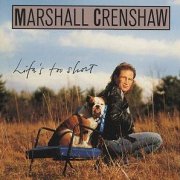 |
Life's Too Short (1991, 45.34) ***/½ |
|
| Better Back Off Don't Disappear Now Fantastic Planet of Love Delilah Face of Fashion Stop Doing That Walkin' Around Starting Tomorrow |
Everything's the Truth Somewhere Down the Line |
|
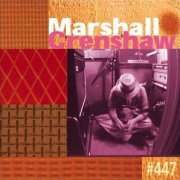 |
#447 (1999, 39.43) ***½/TT |
|
| Opening Dime a Dozen Guy Television Light Glad Goodbye West of Bald Knob Tell Me About it Ready Right Now Eydie's Tune |
T.M.D. Right There in Front of Me You Said What?? |
|
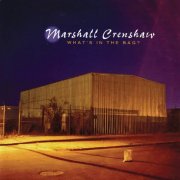 |
What's in the Bag? (2003, 47.44) ***½/TT |
|
| Will We Ever? Where Home Used to Be Take Me With U From Now Until Then Despite the Sun The Spell is Broken A Few Thousand Days Ago Long and Complicated |
I'd Rather Be With You Alone in a Room Aka "a Big Heavy Hot Dog" |
|
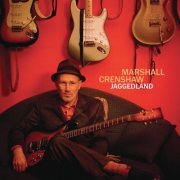 |
Jaggedland (2009, 46.04) ***/T |
|
| Right on Time Passing Through Someone Told Me Stormy River Gasoline Baby Never Coming Down Long Hard Road Jaggedland |
Sunday Blues Just Snap Your Fingers Eventually Live and Learn |
|
Current availability:
Mellotrons/Chamberlin used:
Marshall Crenshaw is revered in some circles as a God Of Powerpop, although going by these albums, I'm not sure I'm ready to join the cult just yet. They're not bad records, by any means, with at least a couple of excellent tracks on every one, but only one of these leapt out at me as something I'll play again in the near future. Crenshaw's biggest hit was his eponymous 1982 debut and, while he spent the '80s on major labels, his particular brand of intelligent, melodic pop has been subsequently sidelined onto indies. At least he stands a better chance of not being treated like crap, I suppose.
His sixth album, 1991's Life's Too Short (still on a major), is decent enough, if slightly unengaging, despite its thankful insistence on not sounding like a late-period '80s record. Actually, most of the songs are good, although Starting Tomorrow's a little slushy and the slightly countryish Somewhere Down The Line's a rather low-key closer. Producer Ed Stasium is credited with Mellotron, with what sounds like background flute chords in Somewhere Down The Line, although it's almost impossible to spot. Eight years on, the difference in style and production values on '99's #447 is impossible to miss. I'm not sure if it's that the songs are better, or the more sympathetic arrangements and instrumentation make them sound that way, but it's a far more listenable album (to my ears, anyway) than Life's Too Short, highlights including Dime A Dozen Guy, Tell Me About It and Ready Right Now. Crenshaw and Brad Jones play Mellotron and Chamberlin respectively, with (presumably) a wonky Mellotron strings melody on Glad Goodbye, flutes on the instrumental West Of Bald Knob and strings on T.M.D.
2003's What's in the Bag carries on the good work, top tracks including Take Me With U, the rocky From Now Until Then and Long And Complicated. Crenshaw on Mellotron again, cellos and strings on Where Home Used To Be, instrumental Despite The Sun and A Few Thousand Days Ago, the strings particularly upfront on the instrumental. 2009's Jaggedland, while recognisably Crenshaw, is a little more low-fi than previous excursions and the 'great song' count seems to be lower than on #447, although opener Right On Time and Stormy River are worth hearing. Crenshaw plays Mellotron once again, albeit not much, with cellos and strings eventually making themselves known on the title track and, while they could be hidden away elsewhere, it's almost impossible to tell.
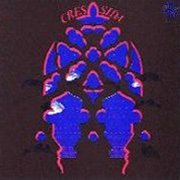 |
Cressida (1970, 46.39) ****/T |
|
| To Play Your Little Game Winter is Coming Again Time for Bed Cressida Home and Where I Long to Be Depression One of a Group Lights in My Mind |
The Only Earthman in Town Spring '69 Down Down Tomorrow is a Whole New Day |
|
Current availability:
Mellotron used:
Cressida were yet another formative progressive outfit whose style has become known as 'proto-prog' (see: Spring, Gracious!, etc.); organ-dominated, late-period psych stylings jostling for space with those new-fangled progressive ideas. Yup, it's 1970. Cressida is actually very good, although, like just about all albums of this type, it sounds rather dated these days, even by the standards of the genre.
Peter Jennings' Mellotron work only features on two tracks: Cressida itself has some lush MkII strings, while Down Down has rather less of the same, although it's a wonderful song. Actually, it's a really nice album and I'm assured that upon repeated plays many of the songs will end up sticking like glue. Anyway, if you like this particular style, I'll recommend this for the music, though not for the Mellotron.
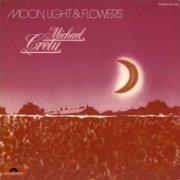 |
Moon, Light & Flowers [a.k.a. Ausgewählte Goldstücke] (1979, 36.02) **/½'57 (The Year I Was Born)Fire and Rain Shadows Over My Head Love Me Moonlight Flower Sparks of Imagination Streets of Time Song for Unknown Heroes |
Current availability:
Mellotron used:
Romania's Mihai Creţu found fame as Michael Cretu, going on to form the enormously successful Enigma in the '90s. His first solo album, 1979's Moon, Light & Flowers (Ausgewählte Goldstücke in Germany) is a pretty insipid effort, to be honest, full of drippy love songs like Love Me and Sparks Of Imagination, or crummy pseudo-disco like opener '57 (The Year I Was Born) (sample lyric: "Fifty-seven is the year I was born/Nothing special in the eyes of the Lord"), or Shadows Over My Head. Its only real saving grace is Cretu's heavy reliance on synths, some decent sounds peering through the mix in those pre-digital days.
Cretu's only obvious Mellotron use on the album is the choirs on six-minute (an epic, no less!) closer Song For Unknown Heroes, although those chords seem to go on longer than they should... Maybe he worked out the 'two octaves the same' technique, whereby the player can fake a perpetual choir chord; it's actually one of the less arresting keyboard sounds on the album, not really enhancing the track. So; do you like late '70s Euro-disco/balladry? Yes? Maybe this album's for you, then. If Cretu had used similar synth sounds on some less gloopy material, I might like it a little more myself, too.
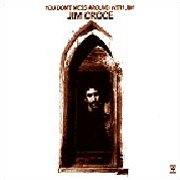 |
You Don't Mess Around With Jim (1972, 32.16) ***½/½ |
|
| You Don't Mess Around With Jim Tomorrow's Gonna Be a Brighter Day New York's Not My Home Hard Time Losin' Man Photographs and Memories Walkin' Back to Georgia Operator (That's Not the Way it Feels) Time in a Bottle |
Rapid Roy (the Stock Car Boy) Box #10 A Long Time Ago Hey Tomorrow |
|
Current availability:
Chamberlin used:
Right: this one's a bit of a leap of faith for this site. Someone called Cheyenne wrote to me a while back, claiming that Croce's track Time In A Bottle featured a Mellotron harpsichord patch, apparently from the very same machine that was played on Strawberry Fields (yeah, right), his (or her?) proof being that their dad was the musician in question, which presumably makes them the offspring of a certain Tommy West. OK. No. 1: The nearest the Mellotron ever got to a harpsichord patch is the MkII's 'harpsichord effect'. No. 2: The album was recorded in New York and it seems likely the 'Strawberry Fields' machine still resided in London at that time. No. 3: Huh? However.... There is a Chamberlin harpsichord and, listening to the brief snippets on Mellotron.com, the high note sounds an awful lot like the ones on the track... So, I'll give this the benefit of the (considerable) doubt and review it on that basis.
Jim Croce's story is an ultimately tragic one; after an initial album in 1969, he finally got himself signed properly in his late twenties, released two albums in quick succession in 1972, then died in a plane crash the following year, just before the release of his next record. You Don't Mess Around With Jim is the first of his 'proper' albums, a worthy slice of early-'70s rootsy singer-songwriter fare, its obvious highlight being Time In A Bottle, which, by the way, has nothing to do with its alleged Chamberlin use. The rest of the material varies, the slower stuff working better, at least to my ears, but nothing really grates, which is more than you can say for many of his contemporaries.
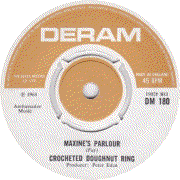 |
7" ( 1968) ***½/TT Maxine's Parlour Get Out Your Rock'n'Roll Shoes |
Current availability:
Mellotron used:
Crocheted Doughnut Ring were a short-lived late '60s outfit who released four singles in total, including one as the abbreviated Doughnut Ring. The nicely psychedelic Maxine's Parlour was the third of these, standing up well in comparison with other second-division acts of the day, although I can't find out whether it's been anthologised. The flip, Get Out Your Rock'n'Roll Shoes, however, sounds exactly as you'd expect and really isn't worth the effort.
John Chapel plays Mellotron strings and flutes on the a-side, making this all the more in need of finding its way onto a compilation. Actually, given that the band released eight sides, they probably recorded more, if only as demos, so surely someone could put out an album? Anyway, worth hearing if you get the chance.
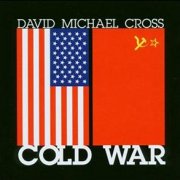 |
Cold War (1983, 30.28) ***½/TCold War (Nuclear War)Nuclear War (part II) Nuclear Winter Human Clones Future Man The Elohim The Golden Age Star Gate |
Current availability:
Mellotron used:
Edward "David Michael Cross" Upton's obscure Cold War was released on CD in 2003, but its music is spot-on early '80s electro, while the lyrics are strangely preoccupied with nuclear war. It seems that Cross' album was actually originally released on a tiny label in 1983, which explains everything, as it's as firmly stuck in its era as anything I've heard all year, albeit not actually in a bad way. It's almost pointless trying to isolate any 'best tracks', although opener Cold War (Nuclear War) is almost a microcosm of the entire record.
Cross plays Mellotron, with the inevitable choirs on Future Man, providing the track's main chordal backdrop. Plenty of other cool gear on board (hey, pre-digital!), but only one Mellotron track. I'd like to commend White Leather for this worthy resurrection; if only most obscure reissues were this good. Oh and speaking of the cold war, the next time you feel inclined to moan about how bad things are, remember (if you're old enough) the nuclear paranoia of the '60s through to the '80s, then shut up whingeing.
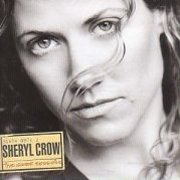 |
The Globe Sessions (1998, 54.55/66.46) ***/T |
|
| My Favourite Mistake There Goes the Neighborhood Riverwide It Don't Hurt Maybe That's Something Am I Getting Through Anything But Down The Difficult Kind |
Mississippi Members Only Crash and Burn Subway Ride [Various bonus tracks include: Carolina Resuscitation Sweet Child o'Mine] |
|
Current availability:
Mellotron/Chamberlin used:
Already in her thirties by the release of her third album, Crow had been in the business since the mid-'80s, initially singing backup for Michael Jackson on his Bad tour. The Globe Sessions is a fairly typical female roots rock album, being pretty standard singer-songwriter fare with a side helping of Americana and plenty of 'authentic' instruments, including keyboards. I'm not really qualified to comment on the quality of the songs, I suspect, as this isn't especially to my taste, but it's considerably less irritating than, say, Vonda Shepard, which could be taken as a recommendation of sorts.
Tape-replay on one or two tracks, depending on which version you own, with the inimitable Benmont Tench (of Tom Petty fame) on Chamberlin solo violin on Crow's version of Dylan's Mississippi and Crow herself on inaudible Mellotron on Resuscitation, one of the various versions' bonus tracks.
See: Samples etc.
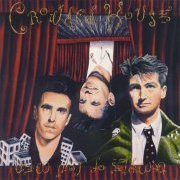 |
Temple of Low Men (1988, 38.12) ****/TT½ |
|
| I Feel Possessed Kill Eye Into Temptation Mansion in the Slums When You Come Never Be the Same Love This Life Sister Madly |
In the Lowlands Better Be Home Soon |
|
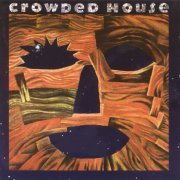 |
Woodface (1991, 48.13) ****/T½ |
|
| Chocolate Cake It's Only Natural Fall at Your Feet Tall Trees Weather With You Whispers and Moans Four Seasons in One Day There Goes God |
Fame is All I Ask As Sure as I am Italian Plastic She Goes on How Will You Go |
|
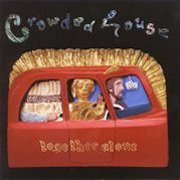 |
Together Alone (1993, 51.41) ****/TT |
|
| Kare Kare In My Command Nails in My Feet Black & White Boy Fingers of Love Pineapple Head Locked Out Private Universe |
Walking on the Spot Distant Sun Catherine Wheels Skin Feeling Together Alone |
|
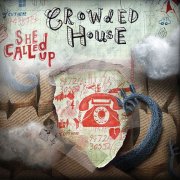 |
CDS (2007, 10.18) ***½/T She Called Up So Dramatic People Are Like Suns (piano version) |
Current availability:
Chamberlins used:
As far as I can work out, Neil Finn, younger brother of Tim, joined Split Enz for their second album proper, Dizrythmia, ending up dominating the group by the time they split (ho ho) in the mid-'80s; please correct me if I'm wrong, but that's the impression I get. After a short break, he formed the immensely successful Crowded House, whose remit was obviously 'intelligent, timeless pop', in, which I have to say, they totally succeeded. I was put off hearing them by their reputation as 'wussy, mainstream stuff' - my loss; what an excellent band. Their debut, 1986's Crowded House (****) contains probably their best-known and best-loved song, Don't Dream It's Over, although they hadn't yet discovered the keyboard that was to have such an impact on their sound.
They released Temple of Low Men (an ironic gay reference, in case you were wondering) two years later and it's immediately apparent that Mr. Tape Replay has called in the interim. Producer Mitchell Froom had obviously introduced them to the wonders of the Chamberlin by this time and they responded by slapping it all over the album, or at least its first side. Incidentally, a notable feature of Crowded House's entire career is a welcome lack of '80s productions', giving them a timeless (that word again) sound, without the usual horrible electronic drums, digital synths and gated reverb that ruined so many potentially good albums during that decade (see: XTC). That isn't to say there aren't any polysynths or sample-playback here, only that they're kept well in check. Anyway, Temple... is stuffed with great songs, highlights including I Feel Possessed and Kill Eye. On the Chamberlin front, Froom plays it alongside other newer and older 'boards, including a Wurlie piano, with strings and flutes all over the first four tracks, with particularly nice flutes on Into Temptation.
Playing Woodface again reminds me of why I initially hated the band. Some years ago, I recorded a few backing tracks for a couple of guys who 'gigged' by singing over them, including a couple by the godawful Mike & the Mechanics and CH's It's Only Natural. I grew to hate the song over the lengthy (and ludicrously underpaid) process and it's taken me until quite recently to get over the experience. Of course, the song's actually excellent, as is the classic Four Seasons In One Day, with several other minor classics dotted around. I believe it's Froom on Chamberlin again, with some upfront strings on Tall Trees and a variety of things, including flutes and female voices (?) on Fame Is. It's possible there's more Chamby on the album, but that's all I can hear. Incidentally, the album's notable for older bro' Tim's temporary membership of the band, apparently due to the album growing out of a duo project from the brothers.
Sadly, Together Alone turned out to be the band's (temporary) swansong, their eventual split following an emotional 1996 farewell gig outside Sydney Opera House, the band having become honorary Aussies by that point. The songwriting's as strong as ever, if a little more experimental, highlights including Nails In My Feet and Black And White Boy. Although all guest musicians are credited, including no fewer than three ex-Split Enders, the band don't actually credit themselves, forcing the listener to do a bit of digging to find out they'd added a second guitarist/keyboard player to the lineup, Mark Hart. Depending on which source you believe, it's either Hart or Neil Finn on Chamby, the only certainty being that it's not Froom, with production duties falling to Killing Joke's Youth. Nails In My Feet and Catherine Wheels have some fairly standard strings, while Pineapple Head has an unusual fast flute arpeggio running through it, but again, only a handful of relevant tracks.
Although Finn's largely ignored his Chamberlin since reforming the band in 2006, it turns up on a Time on Earth b-side, So Dramatic (one of two flips to She Called Up), a lovely little ballad, ever so slightly twisted, in true Crowded House style. Finn's credited oboe part runs through the song, although you wouldn't necessarily spot it if you didn't know.
A final 'odds'n'sods' album appeared in '99, Afterglow (***½), but, despite a couple of 'possibles', I don't think there's any Chamby on it, though I'm always willing to be proven wrong... Many of you will hate this stuff, but if you like intelligent pop, there's a good chance you'll go for it. The Chamberlin work is somewhat variable and I couldn't really recommend any of these on those grounds alone, but with several excellent Chamby tracks, if you're going to buy the albums anyway, think of them as a bonus. The brothers Finn released a collaboration in '95, Finn (a.k.a. Finn Bros), before both heading off into solo waters. Neil still uses his Chamberlin (a Music Master 600, I believe) on his own albums and it seems that just about anything with the Finn name on it is probably worth hearing if you like their style. As a quick postscript, I've seen an interview snippet somewhere where Neil admits to 'sometimes' using Chamby samples on at least one of the above albums. All extra info to the usual address...
See: Neil Finn | Finn | Split Enz
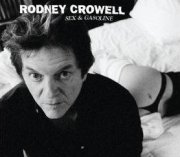 |
Sex & Gasoline (2008, 48.11) ***½/T |
|
| Sex and Gasoline Moving Work of Art The Rise and Fall of Intelligent Design Truth Decay I Want You #35 I've Done Everything I Can Who Do You Trust |
The Night's Just Right Funky and the Farm-Boy Forty Winters Closer to Heaven |
|
Current availability:
Chamberlin used:
Rodney Crowell's been around far longer than I'd expected, having been born in 1950 and married to Rosanne Cash for many years, releasing his first album in 1978. 2008's Sex & Gasoline is his thirteenth, sitting firmly in the folk/country bracket, rootsy country material without that awful Nashville glitz. Best tracks? The opening title track and The Rise And Fall Of Intelligent Design, although there's little here to make the discerning listener reach for the 'next' button. Incidentally, I'm not sure if the sleeve pic is entirely appropriate for a fifty-eight year-old; put it down to wishful thinking, eh?
Patrick Warren does his usual Chamberlin thing, with a string part on Forty Winters that, like so many others, could be mistaken for a real string section. Sex & Gasoline is the kind of country album that genre fans should be buying, as against the drivel released by the Keith Urbans of this world; witty and thoughtful with Crowell's ear for a good tune. Hang on, it's not populist enough, is it? Silly me.
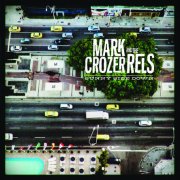 |
Sunny Side Down (2017, 33.30) ***/½ |
|
| All You Gotta Do Corners of Your Mind Lukewarm Love Toxic Town Haunted Head Here Comes the Storm Photographic Memory Plasma |
Loathsome Freddy Say Hello |
|
Current availability:
Chamberlin used:
Oxford's Mark Crozer was a touring member of Scottish enfants terribles The Jesus & Mary Chain before relocating to the States and forming The Rels, the name apparently inspired by Dr. Who. Obviously a Brit, then. Their second full-lengther, 2017's Sunny Side Down, is an indie-end-of-powerpop effort, at its best on Here Comes The Storm, Plasma and top track Loathsome Freddy, although a little less indie and a little more powerpop might've been welcome.
Shawn Lynch plays what I presume is producer Mitch Easter's Chamberlin, if only just, with a handful of near-subliminal string chords on closer Say Hello. All in all, one of those 'decent enough at what it does' albums, but don't bother for the tape-replay.
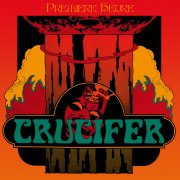 |
Première Heure (2017, recorded 1973, 38.44) ****/TTOuvertureSous le Soleil Cent Paroles Iconoclasme Conte Planétaire Fermeture |
Current availability:
Mellotron used:
And yet more long-lost progressive obscurities come to light... Checkers, from the Strasbourg region, evolved into Crucifer around 1973, recording enough material to compile onto Cameleon's Première Heure in 2017, for once, not a Musea release. Slightly dated for the time, they remind me slightly, in their psych-into-prog moves, of a male-fronted Sandrose, at their possible best on the bonkers Iconoclasme and Conte Planétaire, perhaps. Brief closer Fermeture manages something I don't think I've ever heard before, too, combining Motown and Tchaikovsky in a rather unlikely manner.
Jean Michel Boch, a.k.a. Jimmy Bock, had a very specific approach to his Mellotron use: occasional interjections, for effect. Opener Ouverture belies that, to be fair, with full-on strings just before the band kick into their take on Grieg's Hall Of The Mountain King, but the lengthy Sous Le Soleil, Cent Paroles and Iconoclasme all fit that pattern, Fermeture featuring a higher Mellotronic hit-rate, chiefly because it's under ninety seconds long. Incidentally, Checkers released a single, '72's C'est Un Rêve b/w Ouanita; the flip is a nondescript piece of organ-driven beat/psych, but the 'A' is a pretty decent (if Mellotron-free) slow-burner that wouldn't have disgraced itself on this album.